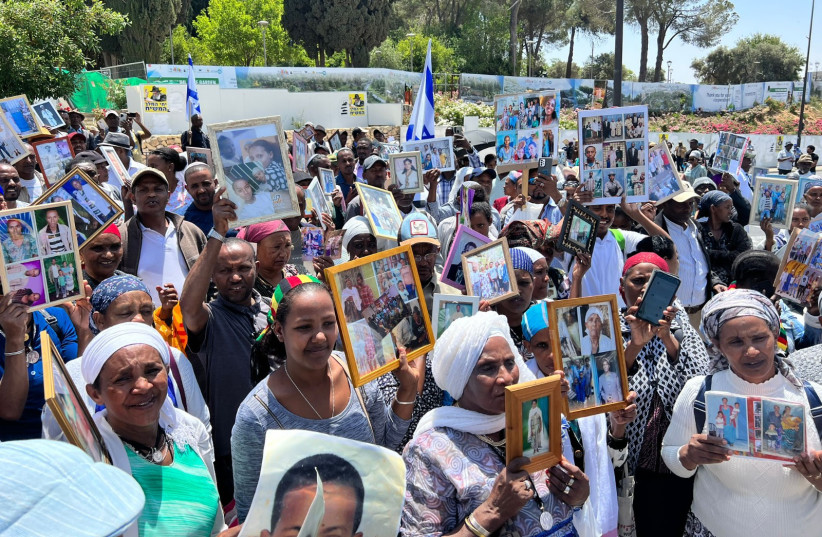For years, Ethiopian Israelis have been subject to police brutality and over-policing, leaving many young people unjustly with a police record that denies them serving in the Israel Defense Forces and the social and economic integration that comes along with that service.
Even so, nearly 10% of IDF soldiers killed in this Gaza war come from the Ethiopian Israeli community even though they represent less than 2% of the Israeli population.
At this painful moment in Israeli history, we should be expunging all the criminal records from Ethiopian Israelis arrested for protesting against racism, just as the government in 2010 expunged all police records of those arrested protesting the disengagement from Gaza in 2005.
A step in the right direction?
A small but important step in this direction was recently taken in the Knesset, when MK Tsega Melaku introduced a bill to expunge the police records from the demonstrators in 2019. In 2019, the late Solomon Tekah, an Ethiopian Israeli youth, was shot to death by a plainclothes police officer in a public park adjacent to his home.
Tekah’s killing led to a spontaneous outbreak of justified protests against police brutality. Just as in the protest of 2015, we observed how the police unfairly handles Ethiopian Israeli demonstrators with crushing brutality, as though they were enemies of the state.

Because of the recognition of the injustice perpetrated against Ethiopian Israeli youths, in 2018, the Ministry of Justice and the President’s Residence publicized a pathway to grant pardons and withdraw criminal charges against Ethiopian Israelis that, in effect, recognized the systemic racism against Ethiopian Israelis.
To our dismay, the pardon pathway failed! The information we received from the President’s Residence shows that only a dozen or so youths were granted pardons by the President. The only way forward is to legislate a clean slate and we want to thank the unity of all the MKs for supporting MK Melaku’s bill and hopefully future bills giving Ethiopian Israelis a second chance.
The record and data are deeply troubling. Protests erupted in the Ethiopian Israeli community in 2015 after police brutality against IDF soldier Demas Pekada was exposed. These protests highlighted issues of police brutality and racism faced by the community, leading to the establishment of a team to address systemic racism, including police brutality, false arrests, and disproportionate criminal cases against Ethiopian Israelis.
THE TEAM submitted a summary report in July 2016 (Palmor Report), determining unequivocally that “the percentage of criminal cases opened against Ethiopian Israelis, as well as the percentage of indictments, are exceedingly disproportionate to the general population.
These irregular data are particularly blatant where minors are concerned.” The Report found that between 2014 and 2015, Ethiopian Israelis faced double the number of cases opened against them compared to their proportion in the population. Particularly grievous was the situation for Ethiopian Israeli minors, with 8.5% of cases opened against them in 2015, over four times their representation in the general population estimated at 1.7%.
The report’s conclusions indicate that many of these cases were opened for offenses such as disturbing the public peace and assaulting police officers, and that criminal charges were pressed “for negligible reasons,” based on requests for identification or for the dumping of alcohol.
It is worth noting that similar conclusions were reached, in both the report by the Israel Justice Ministry’s National Anti-Racism Unit, and the National Comptroller’s 2021 Report, concerning the over-policing of Ethiopian Israelis.
According to the research conducted by the Association of Ethiopian Jews (AEJ) in collaboration with the Legal Clinic for Diversity and Multiculturalism at the Hebrew University based on our request according to the Freedom of Information Law, shows that between 2018 and 2020, of the 357,350 cases opened and classified as “violation of disturbing the public peace,” 14,667 were attributed to Ethiopian Israelis – 4.1% of the total number of cases.
The proportion of cases opened for “violation of the disturbing the public peace offenses” attributed to Ethiopian Israelis was 46% of the total number of cases, while the proportion for the general population was 39.4%.
In 2022, the proportion of cases opened against Ethiopian Israelis was 3%, in relation to being just 1.7% of the population. Opening a criminal case is no small affair. The lives of these young men and women are destroyed, and they pay a heavy price for no justifiable reason. Many avenues in education, employment and army are closed to them, and they become socially marginalized.
A legislative proposal to “Suspend Criminal Proceedings and Annul Records related to the Protest against Police Brutality Pertaining to Ethiopian Israelis – 2023”, was submitted by MK Tsega Melaku. It is an important Proposal that has the potential to provide at least partial reparation for the injustice caused to Ethiopian Israeli youths who, for years – and not exclusively during the demonstrations of 2019 – have been subjected to over-policing and unequal enforcement apparently on the basis of skin color.
In view of the schism between the Ethiopian Israeli community and the state resulting from institutional discrimination and police brutality (and the massive protests in the country that ensued), legislation, as in the case of the Gush Katif evacuees, is called for. This legislation will enable the expunging of criminal and legal proceedings for Ethiopian Israelis.
This will allow them to make a new start, undertake studies and enhance employment avenues in order that they can be better integrated and contribute to Israeli society.
MK Tsega Melaku (Likud), a former director of the Kol Yisrael Reshet Aleph public radio station, is a longtime activist and leader in the Ethiopian Israeli community. Rina Ayalin-Gorelik, an attorney, serves as executive director of the Association of Ethiopian Jews. Yosef Abramowitz is a longtime activist for justice and equality who somehow was never arrested at Ethiopian Israeli rights demonstrations.
